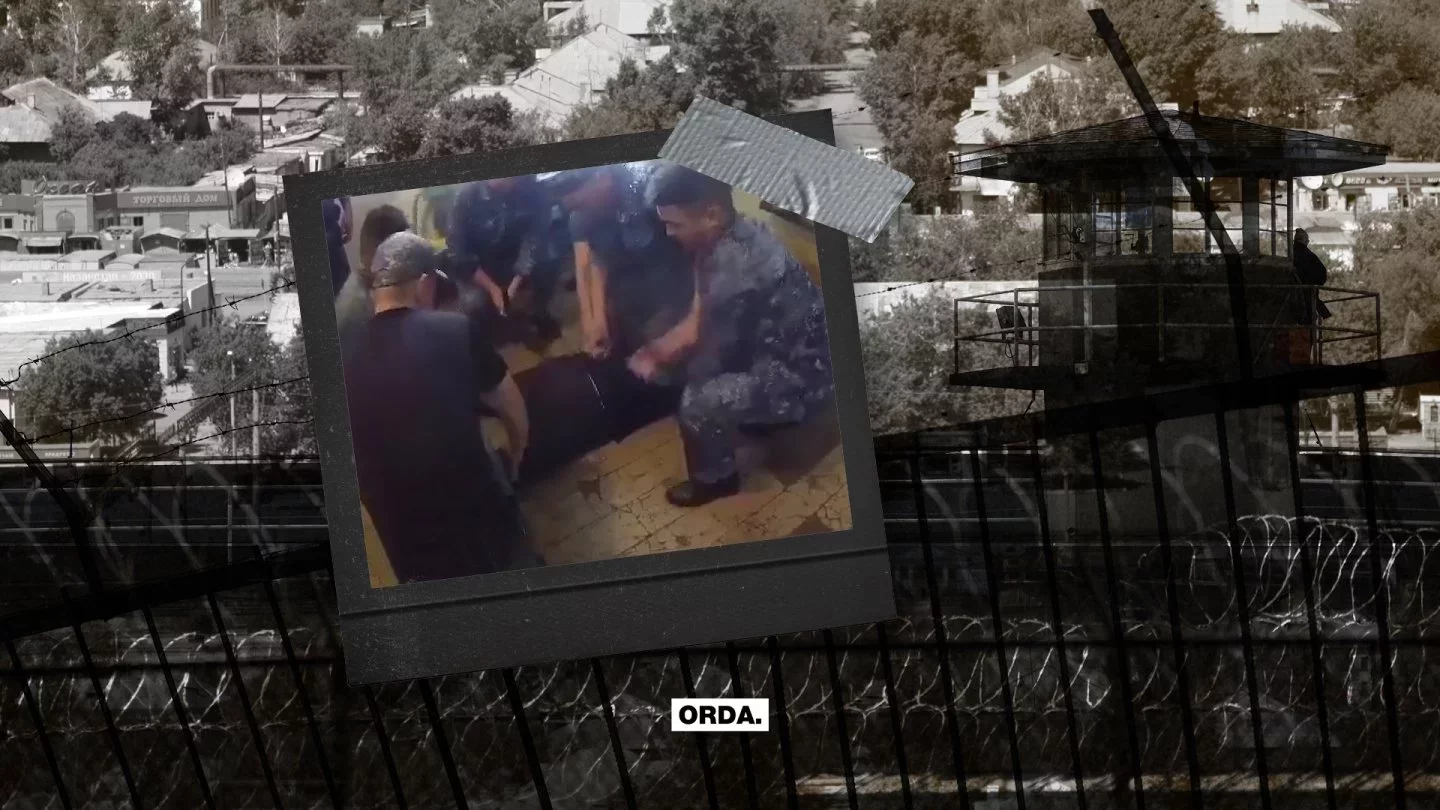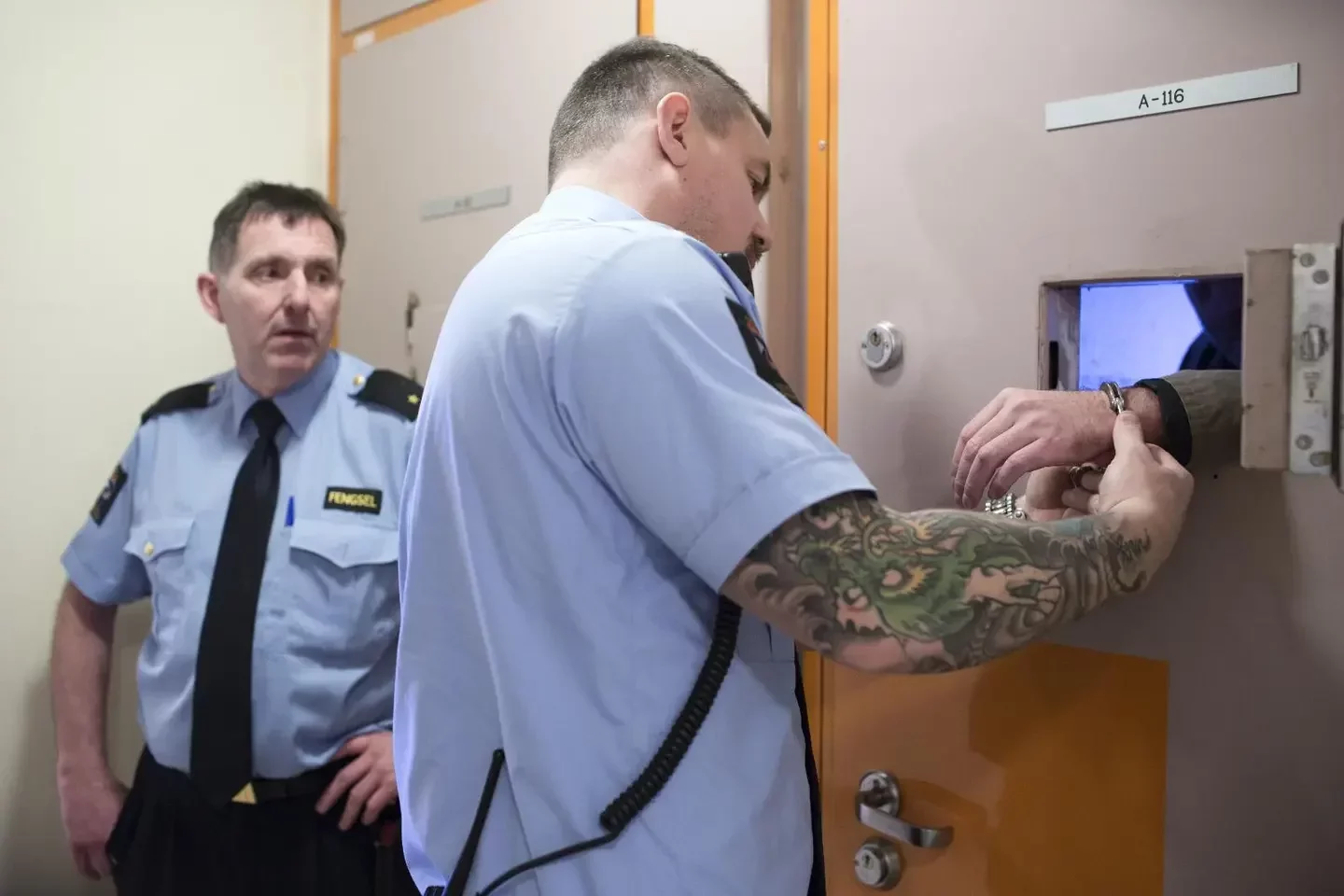Last Resort: Did Atbasar Colony’s Employees Act Accordingly?

A video has surfaced on Kaznet showing Atbasar colony’s employees assaulting an inmate with a rubber baton for refusing to clean toilets. The video brought about public backlash. An internal investigation was subsequently conducted in the institution resulting in the 11 employees involved being dismissed. Meanwhile, the colony’s head along with Aqmola DUIS’s head and his deputy were relieved of their posts.
A different video later emerged. In it, the same 11 employees address the President and the people of Kazakhstan, stating that they acted lawfully and thereby prevented a potential riot. Orda looked into the situation.
Riot On The Horizon
Brief description of the video: The colony staff ask if an inmate if he will wash a bathroom, he refuses. After that, someone gives the order to "use special means." Several people bring the inmate to the floor, hold his arms and legs, while one assaults him several times with a rubber baton below the back. Everything happened in KUIS institution No. 1 in the city of Atbasar, Aqmola region.
(Video 18+: the video contains graphic content, viewer discretion is advised)
Astana activist, Timur Danebayev, convicted under the article for inciting discord, is in the video. This caused the initial reasoning that he was being punished for his political convictions. However, a similar video later appeared. It shows another inmate being assaulted with a baton in the same way for violating routine.
The colony's employees have explained that these events occurred because of repeated violations. In their video appeal, they claim that they actually prevented a potential riot.
According to the former head of the institution, Kazbek Baykadamov, the inmates in the video are those who were transferred to their colony on the night of August 21-22. And the video itself was shot on August 24.
"A total of 44 people were transferred, and all of them violated the established regime. In institutions, including in the quarantine room, where they are required to stay for two weeks, there is a clear schedule: up at 6:00, lights out at 22:00, breakfast, walk, lunch. They can't sleep on the bed when they want, they can't smoke where they want. Namely, these 44 people violated the regime almost from the moment of arrival," says Baykadamov.
Speaking about the legality of the use of force, Kazbek Baykadamov cites a specific law – "On law enforcement service". Paragraph 2 of article 60 of this law does indeed permit the use of special means to stop "group violations of the established regime of detention in institutions of the penal enforcement system." According to Baykadamov, such a mass violation occured in the quarantine room of the institution under his supervision.
However, did Danebayev's refusal to clean a bathroom truly warrant such a method? Kazbek Baykadamov is sure that this is the case, as he also regards it as a violation of the established regime.
Cleaning in the institution, including in the quarantine room, is carried out by the convicts themselves. They do it according to a schedule, which is approved by the unit’s head. This convict, according to the schedule, had to clean the bathroom as well. But he refused. And this was not the only violation on his part, says Baykadamov.
Another argument that Baykadamov puts forward in favor of the legality of his subordinates' actions is the regulatory authorities not seeing violations in this.
Any use of special means is necessarily recorded on video, after which, it is provided to the prosecutor. But he did not see anything illegal in this, says Baykadamov.
Baykadamov considers his and his 11 subordinates’ dismissal illegal and unfair. He is convinced that the reason for the dismissal was the initiation of a criminal case against employees, but recalls that under the Constitution of the Republic of Kazakhstan there is a presumption of innocence. Therefore, their status as suspects cannot serve as a reason for dismissal.
At the same time, General the chairman of the Committee of the Criminal-executive System (KUIS - Ed.), Zhanat Yeshmagambetov, dubbed torture as an the indicator of officers' incompetence. He also said that the reason for their lack of knowledge in rights and laws is the short training of personnel before hiring.
"When recruiting officers, future employees of the UIS take only three-month courses. During this time, it is difficult to prepare professional personnel," Yeshmagambetov said.
Unwritten Rules
Human rights activist Vadim Kuramshin and lawyer Sergey Utkin are ready to dispute Kazbek Baykadamov's opinion about the legality of the use of force. Kuramshin’s assessment of Institution No.1 employees’ actions is quite candid. Kuramshin was tried several times and served time, including in this colony. He believes that the video shows nothing but torture.
This is not a punishment for violating the regime. In the footage we see the conveyer belt process of breaking a personality. This is when everyone gets their head simultaneously thrusted into the toilets and forced to clean them. It wasn’t caught on video, but they were also forced to clean toilets with toothbrushes, says Vadim Kuramshin.
 Vadim Kuramshin. Photo: Vadim Kuramshin's Facebook
Vadim Kuramshin. Photo: Vadim Kuramshin's FacebookKuramshin says he went through a similar procedure when he was transferred to the Atbasar colony.
“My head was also dipped in the toilet. I was kicked in the lower back and my sacrum was damaged, which made me unable to move. And then for 10 days, while I was in quarantine, all kinds of tortures were used on me: bleach, frost, “swallow" (name is referring to the bird - Ed.). I can't talk about some of them for ethical reasons. Regular harassment continued later," says Kuramshin.
Kazbek Baykadamov, however, told an Orda.kz journalist that special means were used extremely rarely in the colony that he supervised.
At the same time, according to Kuramshin, even if Timur Danebayev truly violated the internal regulations, this is not a reason for applying special means. Sergey Utkin shares this opinion.
There is no physical punishment for violations of internal regulations. According to the Criminal Executive Code of the Republic of Kazakhstan, a remark, reprimand, placement in a disciplinary isolation cell, transfer to solitary confinement are assigned to them. There are no other penalties for this. And what we see in this footage looks exactly like corporal punishment. It seems to me that these employees are confused about when they can use force and when they can't. And they are already acting “po-patsanski” (Russian phrase that roughly means to follow unwritten street code -Ed.) - they inflicted pain, made them cry, maybe then a person will break, Utkin says.
 Sergey Utkin. Photo: Sergey Utkin's Facebook
Sergey Utkin. Photo: Sergey Utkin's FacebookAccording to Utkin, it is possible that "Institution No. 1’s" employees may have taken this route because of their unwillingness to comply with bureaucratic procedures. A disciplinary action must be documented.
As for the legality of the dismissal of employees, according to Sergei Utkin, it is necessary to study the results of the internal investigation. Incidentally, KUIS officially announced that one was held on its website. Its results were the basis for the decision to dismiss. Sergey Utkin believes that if KUIS’s management regarded the actions of the employees of the "Institution No. 1" as a violation that amounts to dismissal, then there were reasonable grounds.
Even in Norway
The use of force against prisoners is a penitentiary system’s inherent right in any country. Almost everywhere the procedures for the use of special means are identical. They are used during an attempted escape, resisting prison staff, defending during an attack. These items have been broken down and prescribed more clearly. In Kazakhstan, for instance, it is specific statement that this is used for the release of hostages and for civilians’ protection in colonies.
"Special means" is a post—Soviet clerical system used by law enforcement officers of Kazakhstan, Belarus, and Russia. The term "translates" as a baton (in the language of the Ministry of Internal Affairs – a rubber stick), handcuffs, stun guns, gas canisters, firearms, etc. In Norway’s legislation all this is less veiled and is dubbed as "weapons".
 Prison guards in Norway. Photo: Bergens Tidende.
Prison guards in Norway. Photo: Bergens Tidende.The use of force against is permitted in prisons around the world, however, it is meant to be a last resort in the same capacity. This includes Kazakhstan. Was this the case in Atbasar’s “institution No.1”? The colony’s employees seem to believe so, though their superiors do not.
Original Author: Igor Ulitin
DISCLAIMER: This is a translated piece. The text has been modified, the content is the same. Please refer to the original article in Russian for accuracy. The original piece was published on 08/09/2023, it has been updated to reflect the current situation.
Latest news
- Timur Kulibayev vs. New Kazakhstan: Oligarch Defends His Assets
- MP supported Imam's Statements About Kazakh Traditions
- Altyn Adam: How Filmmakers Quarreled Over Cartoon About Scythian Warrior
- "No Chance": Russian Deserters' Stories in Kazakhstan
- National Fund Earns As Much As It Spends
- What is Going on with FPL Head's Recent Appointment?
- Stati Case: Victory for Kazakhstan?
- Qataris to Spend $3.5 Billion on Construction of Plants in Kashagan
- Oil Quotas: a Blessing or a Curse for Kazakhstan?
- Plant in Kazakhstan: Swiss Investor Purchased, Legal Battle Follows
- Situation with Russian Securities in Kazakhstan Explained
- Uranium Mining Tax in Kazakhstan to Change Starting in 2025
- Chinese Oil Giant to Build Wind Farm in Kazakhstan
- Expert Explains Toqayev Greeting Xi Jinping in Particular Way
- Scandal around "Aria-Zhana Astana", Controlled by Satybaldy, Not Subsiding
- SCO Summit in Astana: What to Expect?
- Who Was Oppositionist Aidos Sadykov?
- KNB Agent Orik VS Financial Police Agent Sanych
- Nazarbayev's Relatives on Trial: Systemic Purge or Political Games?
- Fire in Greece: Luxury Yacht, Kazakhstani Oligarchs' Vacation Scandal

